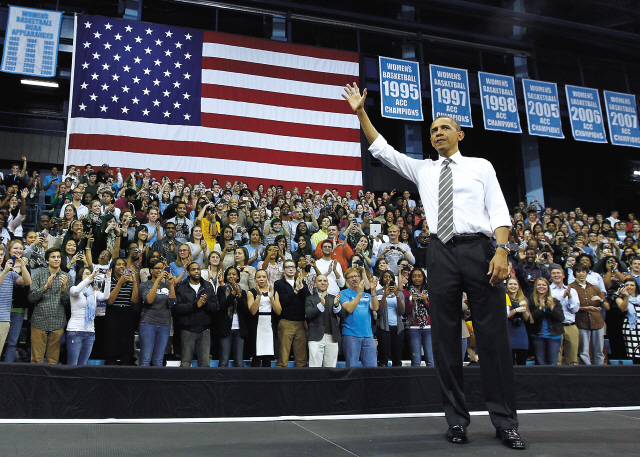 |
President Barack Obama acknowledges the crowd after speaking at the University of North Carolina in Chapel Hillon, on April 24. (AP-Yonhap News) |
WASHINGTON (AP) ― The U.S. presidential race is turning ever nastier as Republican challenger Mitt Romney and President Barack Obama battle to break out of one of the closest presidential contests in recent history.
After months of hammering Obama over the struggling U.S. economy ― the incumbent president’s greatest vulnerability ― Romney has not been able to erase his opponent’s slight lead in the polls.
So, the Republican has changed tactics, going after Obama’s greatest strength. Voters like the president even if they don’t like his policies. To that end, Romney on Wednesday said Obama was running a White House campaign of “division and attack and hatred.” That’s uncommonly tough language even in the rough-and-tumble of U.S. politics.
The Obama campaign responded that Romney seemed to have come “unhinged.”
Romney’s outburst followed by one day remarks by Vice President Joe Biden. He told an audience that included many African-Americans that a Romney presidency would put Americans “back in chains” by repealing Wall Street regulations.
Intended or not, the Romney camp took that as an attempt to link Republicans to America’s troubled history of slavery.
“These are comments, I think, that a lot of people find troubling,” Romney said on Thursday.
Romney’s attack against the very nature of the Obama campaign most likely grew from accumulated frustration over assaults by the Obama campaign ― and those of a so-called super political action committee that supports the president’s campaign.
Priorities USA Action, the Obama aligned group, aired a commercial implicating Romney in the cancer death of the wife of a man who worked at a steel plant that was bought and subsequently shut down by Romney’s venture capital firm, Bain Capital.
Romney benefits even more from such committees, which were set up after the conservative-dominated U.S. Supreme Court ruled that corporations and unions had a first amendment right to free speech. That allowed super-pacs to raise and spend unlimited amounts on behalf of a candidate so long as there was no direct coordination.
Harry Wilson, an expert in presidential politics and professor of public affairs at Roanoke College, said presidential campaigns always are brutal affairs. “That said, if we continue on this track, this ought to set some record for nastiness and brutality.”
In an interview Wednesday with the Entertainment Tonight television program, Obama downplayed Romney’s complaints.
“Governor Romney, I think, has had very sharp critiques of me and my policies, and that’s how it should be,” Obama said. “That’s the nature of democracy, and I’ve got some sharp disagreements with him in terms of where he would take the country.”
Wilson said the Obama machine has been trying to paint Romney not just as someone who is fabulously wealthy but also as a candidate “who doesn’t like people who are not wealthy. This is not about policy. And Obama has been under similar personal attacks throughout his term.”
Some Obama defenders argue that Democrats are only now turning long-used Republican tactics back on the Romney candidacy.
They cite remarks four years ago by Sarah Palin, the 2008 Republican vice presidential candidate, who said Obama had “palled around with terrorists.” Reaching back to 2004 they point to the so-called “swift-boating” of Democratic presidential candidate John Kerry, a massive advertising campaign designed to falsely denigrate his Vietnam war record. Kerry commanded the crew of a swift boat assault vessel during that war.
While voters claim they don’t like negative advertising, candidates rely on that tactic more and more.
“I would focus on the fact that few voters are undecided about their vote at this relatively early period. Hence candidates are trying increase the intensity of support and ultimately turnout among their base,” said Lynda Power, an expert in American politics and professor of political science at the University of Rochester. “One might speculate that when candidates target core constituents, the negativity could be useful in motivating the base.”
Ten or fewer of the 50 U.S. states will decide the Nov. 6 presidential election. The nationwide popular vote does not decide the election. Instead it is a state-by-state contest. The vast majority of the states are already in either the Romney or Obama camps. What’s more most Americans say they already have decided which way they will vote. That means those ten states that do not reliably vote for one party or the other in presidential race, states like Ohio and Pennsylvania, will decide the nation’s next leader.








